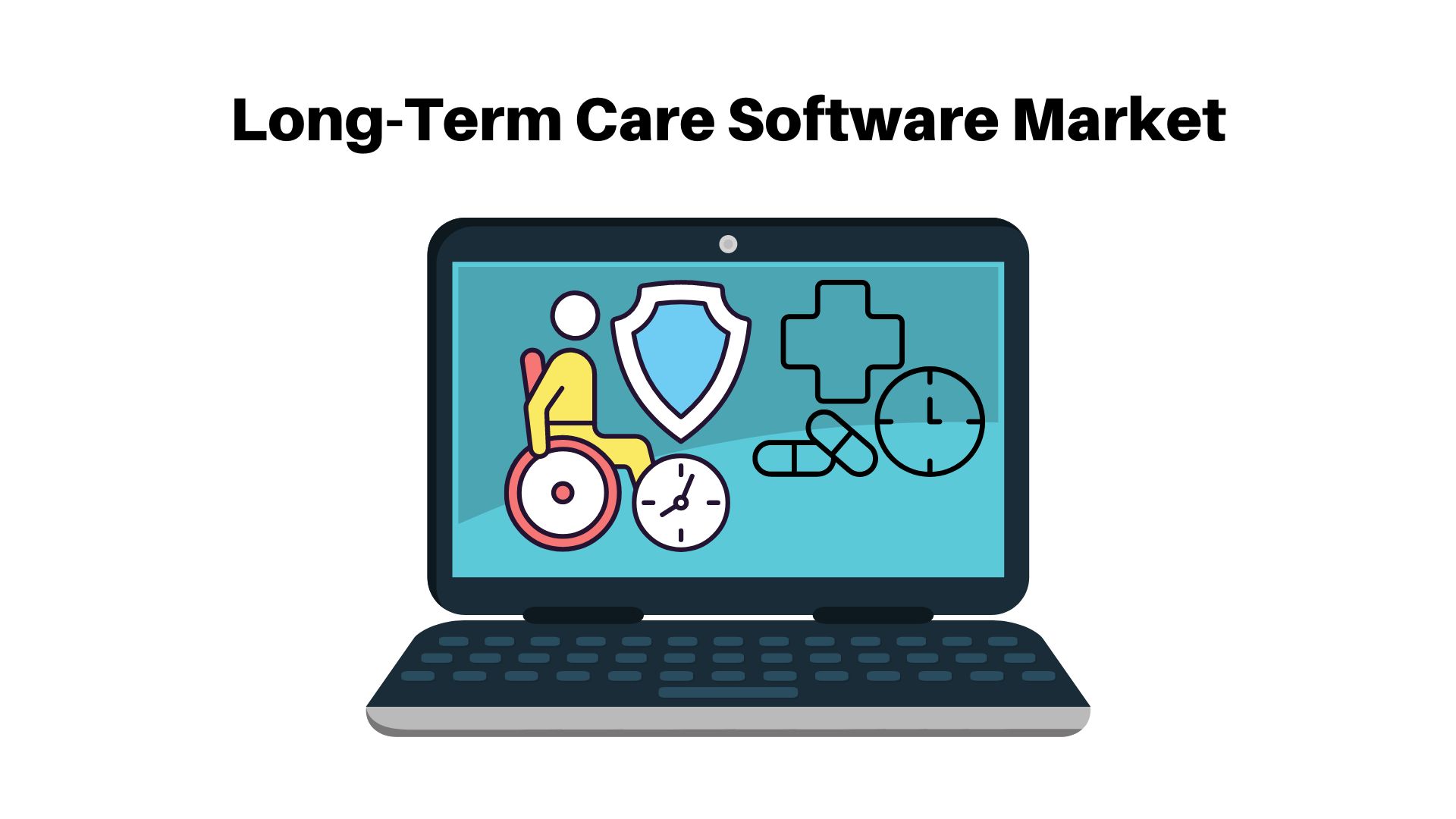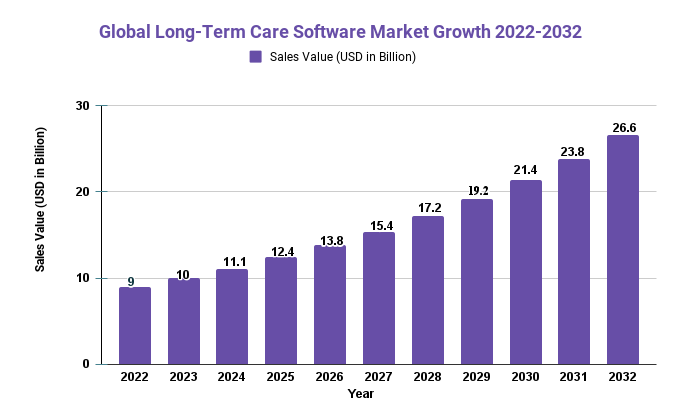Long-Term Care Software Market Size USD 26.6 Bn by 2032| at a CAGR 11.5%

Page Contents
Market Overview
The Long-Term Care Software Market is experiencing rapid growth and is expected to keep expanding in the upcoming years. This sector consists of software solutions designed to assist healthcare providers in managing patient care at long-term care facilities such as nursing homes, assisted living communities, and hospices.
One of the primary factors propelling growth in this market is an aging population worldwide. As more elderly individuals join the society, the demand for long-term care services is expected to increase. Furthermore, the COVID-19 pandemic has highlighted the significance of effective and efficient long-term care management, further fuelling growth within this space.
One factor driving the growth of the long-term care software market is the increasing adoption of electronic health records (EHRs) among healthcare providers. EHRs can enhance patient care quality by giving healthcare providers access to accurate and up-to-date patient data.
The long-term care software market is highly competitive, with major players such as Cerner Corporation, McKesson Corporation, and Epic Systems Corporation dominating it. However, there are also a few smaller companies that are making strides in this space by providing innovative solutions tailored to the needs of long-term care providers.
In 2022, the global Long-Term Care Software Market was valued at USD 9.0 Bn and is projected to reach a value of $26.6 Bn by 2033 with an annual compound growth rate (CAGR) of 11.5% over this forecast period. This growth is being spurred on by factors such as an aging population, increasing adoption of EHRs, and an increasing need for effective long-term care management solutions.

Drivers, trends, and challenges have an impact on market dynamics, which can impact businesses. Request for PDF sample report
Key Takeaways
- The long-term care software market is expected to experience tremendous growth over the coming years, due to an aging population, rising adoption of electronic health records, and growing need for effective long-term care management solutions.
- Major companies such as Cerner Corporation, McKesson Corporation, and Epic Systems Corporation dominate the market; however, smaller startups are finding success by offering innovative solutions tailored to long-term care providers' specific needs.
- The COVID-19 pandemic has underlined the need for effective long-term care management, fueling demand for long-term care software solutions.
Regional Snapshot
- North America is the leading market for long-term care software, due to factors such as an aging population, high healthcare spending, and well-established healthcare infrastructure.
- Europe is an important market, with countries such as Germany, France, and the UK investing in digital healthcare infrastructure and increasing EHR adoption rates.
- The Asia-Pacific region is projected to witness significant growth in the long-term care software market, due to factors such as an aging population and rising healthcare expenditure in countries like China, Japan, and India.
- Latin America, the Middle East, and Africa regions are expected to witness growth in the long-term care software market due to increasing investments in healthcare infrastructure as well as an increasing need for such services.
Drivers
Aging Population: The global increase in elderly populations is fueling demand for long-term care services and solutions, such as long-term care software.
Increased Adoption of Electronic Health Records (EHRs): Healthcare providers are increasingly implementing EHRs to enhance patient care, leading to an uptick in demand for long-term care software solutions.
Growing Need for Effective Long-Term Care Management: As the demand for long-term care services continues to increase, healthcare providers are searching for software solutions that can help them manage patient care more efficiently and effectively.
COVID-19 Pandemic: This crisis has highlighted the need for effective long-term care management solutions, including software. As such, demand for long-term care software continues to increase.
Restraints
High costs of implementation: Implementing long-term care software solutions can be expensive for smaller healthcare providers, which could limit their adoption of these solutions.
Concerns Over Data Privacy and Security: As long-term care facilities increasingly rely on electronic health records and other software solutions, concerns over data privacy and security can arise, potentially delaying adoption.
Limited Access to Skilled Personnel: Adopting and successfully using long-term care software solutions requires skilled personnel, which may be in short supply in certain regions. As a result, adoption may be limited.
Interoperability Issues: Interoperability between different software solutions can be an issue in the long-term care industry, which could limit its effectiveness.
Opportunities
Technological Advancements: New technologies such as artificial intelligence (AI), machine learning (ML), and the Internet of Things (IoT) offer prospects for developing innovative long-term care software solutions.
Emerging Markets: The long-term care software market remains relatively underutilized in many emerging economies, providing opportunities for expansion and growth.
Collaborations and Partnerships: Collaborations between healthcare providers and software vendors can help create and implement efficient long-term care software solutions.
Increasing Demand for Home Healthcare Services: As demand for home healthcare services grows, there are now more opportunities for long-term care software solutions that can facilitate remote patient monitoring and care.
Challenges
Limited Interoperability: Interoperability between different long-term care software solutions can be a hurdle, hindering their efficiency.
Data Privacy and Security Concerns: The use of electronic health records and other software solutions in long-term care facilities raises privacy and security issues that may hinder their adoption.
High Implementation Costs: The high cost of implementing long-term care software solutions may prove prohibitive for smaller healthcare providers, thus hindering adoption.
Lack of Standardization: Lack of uniformity within the long-term care industry can present challenges when developing and implementing successful software solutions for this sector.
Recent Developments
- In January 2022, PointClickCare, a leading long-term care software vendor, announced the acquisition of Collective Medical, a real-time care coordination platform. This acquisition will allow PointClickCare to expand its offerings and improve care coordination for long-term care providers.
- In December 2021, Netsmart, a leading provider of electronic health records and other healthcare software solutions, announced a partnership with the American Health Care Association/National Center for Assisted Living (AHCA/NCAL) to develop a national quality benchmark for post-acute and long-term care providers.
- In November 2021, MatrixCare, a long-term care software provider, announced the launch of its new care management platform, which includes features such as clinical decision support and data analytics.
- In October 2021, the U.S. Centers for Medicare and Medicaid Services (CMS) released new rules requiring nursing homes to implement electronic visit verification (EVV) systems to improve care quality and reduce fraud.
Key Market Segments
Type
- On-premise
- Cloud-based
Application
- Home Healthcare Agencies
- Nursing Homes
- Hospice care facilities provider
Key Market Players
- Allscripts Healthcare Solutions Inc.
- Cerner Solutions
- Omnicare Inc.
- Omnicell Inc.
- HealthMEDX LLC
- McKesson Corporation
- Optimus EMR Inc.
- PointClickCare
- MatrixCare
Report Scope
| Report Attribute | Details |
| The market size value in 2022 | USD 9.0 Bn |
| Revenue Forecast by 2032 | USD 26.6 Bn |
| Growth Rate | CAGR Of 11.5% |
| Regions Covered | North America, Europe, Asia Pacific, Latin America, and Middle East & Africa, and the Rest of the World |
| Historical Years | 2017-2022 |
| Base Year | 2022 |
| Estimated Year | 2023 |
| Short-Term Projection Year | 2028 |
| Long-Term Projected Year | 2032 |
Frequently Asked Questions
Q: What is long-term care software?
A: Long-term care software refers to software solutions designed to help healthcare providers manage long-term care services and patient care, including electronic health records (EHRs), care management platforms, and medication management systems.
Q: What is driving the growth of the long-term care software market?
A: The growth of the long-term care software market is being driven by factors such as the aging population, increasing adoption of EHRs, and growing demand for efficient long-term care management solutions.
Q: Who are the major players in the long-term care software market?
A: Major players in the long-term care software market include Cerner Corporation, McKesson Corporation, and Epic Systems Corporation.
Q: What are the challenges facing the long-term care software market?
A: Challenges facing the long-term care software market include limited interoperability, data privacy and security concerns, high implementation costs, and lack of standardization.
Q: What are the opportunities for the long-term care software market?
A: Opportunities for the long-term care software market include technological advancements, emerging markets, collaborations and partnerships, and increasing demand for home healthcare.
The team behind market.us, marketresearch.biz, market.biz and more. Our purpose is to keep our customers ahead of the game with regard to the markets. They may fluctuate up or down, but we will help you to stay ahead of the curve in these market fluctuations. Our consistent growth and ability to deliver in-depth analyses and market insight has engaged genuine market players. They have faith in us to offer the data and information they require to make balanced and decisive marketing decisions.